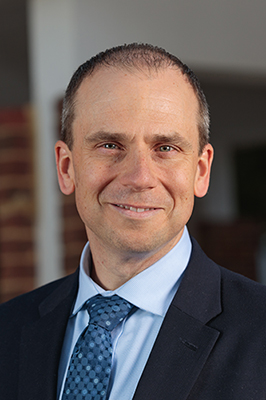In This Story
Keith D. Renshaw, department chair and professor in the Department of Psychology, was recently appointed as associate provost of undergraduate education of George Mason University. He replaces Bethany Usher, who was named provost of Radford University.

Renshaw has served as both department chair and Faculty Senate chair and has extensive connections across the campus community.
“Keith is a long-time faculty member and experienced leader at Mason,” said Provost Mark Ginsberg. “His experiences have prepared him to meet the challenges and optimize the opportunities in his new role. His approach to listening to others and understanding their perspectives, and communicating with a wide range of people from diverse backgrounds and with diverse goals while working to find common ground, will result in increased student opportunity and success at Mason."
Although he formally begins his new position on August 10, Renshaw is already laying the groundwork for his vision to ensure Mason is seen as the national leader in inclusive excellence in higher education—starting with how the university positions its undergraduate students.
“It’s what we do here with our undergraduates—fully integrating such a broad range of students into the programs and experiences here—that makes Mason stand out from other R1 universities,” Renshaw said. “This vision requires continuing to lead in accessibility, while also ensuring that we offer strong supports for students from all types of backgrounds with a diverse range of personal goals, together with an unparalleled learning experience that provides students with the knowledge, skills, abilities, and experiences that we believe all college graduates should have.”
Renshaw will focus on what he views as key elements in the undergraduate curriculum. “Given the needs of students, our region, and broader society, we must ensure that our curriculum is preparing our graduates for careers, while simultaneously ensuring that as a university our curriculum is grounded in academic rigor,” he said.
Renshaw praised the recent revisions to the Mason Core for their alignment with both societal needs and Mason’s values, adding that there is more that can be done to prepare undergraduates for the future.
“Knowing the pace of change in today’s world, revisions to the Mason Core should never be complete—we need to establish processes for a sustainable but continual evolution of these core elements of our education,” he said.
He also wants Mason to expand experiential learning opportunities for students so they learn how to apply their learned knowledge into real-world contexts and solve real-world problems. In order to grow this learning channel and network, Renshaw wants to devise a seamless connection of all undergraduate programs to established ventures such as Mason Impact and its Office of Student Scholarship, Creative Activities, and Research (OSCAR) and Office of Community Engagement and Civil Learning (CECiL) subsidiaries. Doing so, he believes, will ensure research and community engagement opportunities are available across all Mason campuses and online.
Renshaw also believes the university needs to further develop multidisciplinary, interdisciplinary, and transdisciplinary curricula. Additionally, he wants to promote efforts such as the digital tech certification that brought together potential employers and community and government leaders, students and alumni, and faculty and staff, “to identify and find the intersection between needed career preparation and relevant knowledge and expertise within and across disciplines.”
Renshaw believes his experience, compounded with an excitement to work with a multitude of students and faculty, will only propel his ability to connect with others, serve as a mediator, generate ideas, and grow Mason into not just a leader but an exemplar in undergraduate education.
“The prospect of devoting my everyday work to opening doors to more students, supporting those students and helping them work through whatever roadblocks stand in their way, increasing the impact of their time here, and increasing the impact that they, in turn, have on our society is one that I cannot quite capture in words,” he said.
